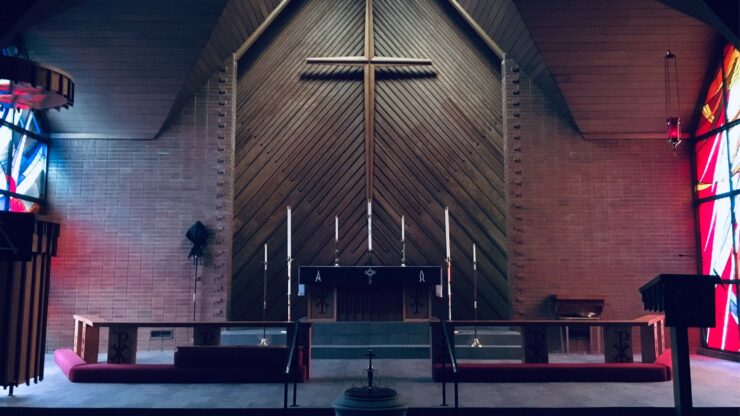Rhythms of Gratitude

In our North American context, we as Christians have three major holidays we celebrate: Christmas, Easter, and Thanksgiving. Jesus grew up in a Jewish family where they annually celebrated the three “Pilgrimage Festivals.”
“According to the daily requirement for offerings commanded by Moses for the Sabbaths, the New Moons and the three annual festivals- the Festival of Unleavened Bread, the Festival of Weeks and the Festival of Tabernacles.“
2 Chronicles 8:13
What can we learn from these festivals about having hearts of gratitude?
First Pilgrimage Festival: Pasach (Passover)
As Christ-followers, we typically associate Passover with Easter. Passover, or Pasach, also known as the Festival of Unleavened Bread, was to be an annual celebration of God’s deliverance for His people from Egypt. On that first Passover, Jews were instructed by God through Moses to slaughter an unblemished lamb and to cover their doorposts with its blood. Then, God would “pass over” their homes as the firstborn males were killed throughout Egypt. It was this final plague that led Pharoah to free the Israelites. God’s provision led to their deliverance.
In remembrance of their deliverance, the Israelites were instructed to celebrate the Passover annually, much like an independence day, commemorating it with the eating of roasted lamb, unleavened bread, and bitter herbs.
As a devoted Jew, Jesus would have traveled to Jerusalem with His family year after year to celebrate Passover and the other pilgrimage festivals. We see Jesus in Jerusalem for Passover as a twelve year old, and then also shortly after His baptism at the beginning of His ministry and for Passion Week at the end of His ministry. At some point, Jesus knew that He was the Lamb of God, sent by the Father to take away the sins of the world. It’s wholly appropriate, then, for us to associate the celebration of Passover with Easter and the gratitude that should overwhelm our hearts for our Savior and His sacrifice on the cross.
“The next day John saw Jesus coming toward him and said, ‘Look, the Lamb of God, who takes away the sin of the world!‘”
John 1:29
Second Pilgrimage Festival: Shavuot (Pentecost)
While Christians worldwide focus on the Day of Pentecost as the time where the Holy Spirit came to dwell within believers and the day the church was born, the Feast of Pentecost has a very specific and significant purpose for Jews. Shavuot, also called the Feast of Weeks, comes seven weeks after Passover. Each of these days and weeks between Passover and Pentecost were purposefully numbered and counted. The Feast of Weeks was a time to celebrate the Spring grain harvest. It was a time to be grateful for God’s provision.
More than just God’s general provision though, Pentecost was originally established as a time where Jews were to remember and celebrate the giving of the Law to Moses on Mt. Sinai. The counting of days and weeks between Passover and Pentecost was meant to be a reminder of the great anticipation of God’s giving of Torah to His people.
As a Jew, Jesus was raised to be grateful for God’s Word. God’s Word was to be treasured. They were to build their lives upon the truth of God’s Word. More than just being grateful for wheat that would provide earthly bread, they were to be grateful for the giving of God’s Word, the spiritual bread they were to feast upon.
An interesting thought… the name Bethlehem, the place of Jesus’ birth, means “House of Bread.” Jesus, the Word made flesh, the Living Word of God, was born in the House of Bread. In some ways, our celebration of Christmas and God’s provision of His Son as our Emmanuel is similar to the purpose of the Jewish celebration of Pentecost. At Christmas, we are to be grateful for God’s provision of the Word made flesh.
“The Word became flesh and made His dwelling among us: We have seen His glory, the glory of the one and only Son, who came from the Father, full of grace and truth.“
John 1:14
Third Pilgrimage Festival: Sukkot (Tabernacles)
The third major festival in Jesus’ day was Sukkot, also known as the Feast of Tabernacles, the Feast of Shelters, the Feast of Booths, or the Festival of Ingathering. Sukkot occurs on the 15th day of the seventh month of the Jewish calendar, sometime between late September and late October. This time of year marks the end of harvest season, and it’s still celebrated in Israel today where the Jewish people set up a tent or shelter outside their home and live in it for seven days. The festival culminates with a great feast.
What was and is the purpose of living in the shelters for this festival? The Feast of Tabernacles is a time to remember God’s provision for the people of Israel while they wandered in the wilderness, homeless and living in tents, as they journeyed to the Promised Land. In this way, the Feast of Tabernacles functioned similar to our Thanksgiving. The Jews were to express gratitude for God’s provision through the current harvest they were enjoying, as well as His provision throughout their history. It was a sacred festival of gratitude for what God had done for them and what God continued to do for them as their Father and Provider.
“Celebrate this as a festival to the Lord for seven days each year. This is to be a lasting ordinance for the generations to come; celebrate it in the seventh month. Live in temporary shelters for seven days: all native-born Israelites are to live in such shelters. So your descendants will know that I had the Israelites live in temporary shelters when I brought them out of Egypt. I am the Lord your God.”
Leviticus 23:41-43
So, what can we learn from these three “Pilgrimage Festivals” about how Jesus practiced gratitude?
- Jesus learned to be grateful for the Father’s deliverance.
- Jesus learned to be grateful for the Father’s presence.
- Jesus learned to be grateful for the Father’s faithfulness.
How will you practice rhythms of gratitude like Jesus?
Subscribe to the Discipleship.org email list here to get blogs like this delivered to your inbox each week.
By Doug Holliday. Used by permission.
If you have enjoyed reading this, please consider joining our email list!











